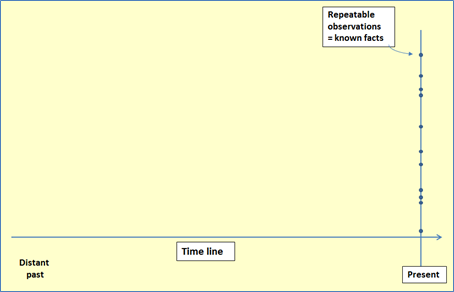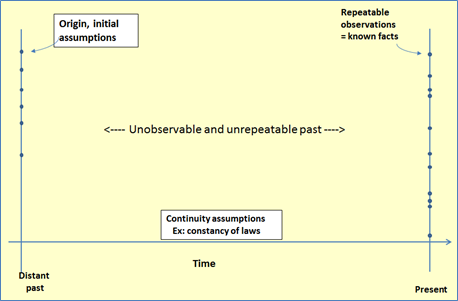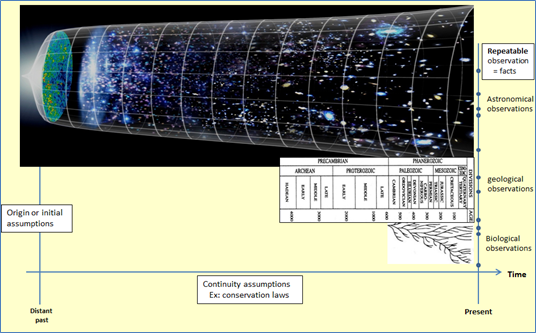There are many definitions of science but most are so broad that they really don’t tell us much. It is much more informative to recognize two major subdivisions of science, namely empirical science and historical science. Properly understood these categories can be very helpful for all to understand what enables the marvelous power and productivity of science and where some ideological traps exist as well. This understanding will clarify the issues for everyone and particularly for students preparing for college. The concept developed below will also help institutional leaders, parents, and students understand how science relates to faith and when to fully embrace science and when to carefully question some of the assumptions.
Empirical (or operational) science involves:
- Repeatableobservation and measurement followed by analysis, hypothesis building and testing. It is essential to note that these activities can only be done in the present.
- Empirical science is responsible for developing all of the laws of physics and chemistry and all of modern technology and medicine. No contribution to any of these things could be accepted without obtaining highly repeatable experimental results first. Repeatability of observations and measurements is the essential thing that establishes scientific facts.
- Empirical science is completely external and independent of one’s concept of who or what we are or what the distant past might have been. This is because empirical science is built on repeatable observation and measurements made by multiple observers in the present. Once we obtain repeatable empirical results, it no longer matters what our preconceptions were, what our self-concept might be, or what our concept of the past might be.
Historical (or forensic) science involves:
- Unobservable and unrepeatable events of the past. The distant past is neither observable nor repeatable so scientists must make multiple assumptions, inferences, extrapolations, and conjectures about past events.
- Trying to understand the distant past, scientists must make some assumptions about the origin conditions and about the continuity conditions that prevail over time. Then they must infer, extrapolate and conjecture what events through time might connect these assumptions to the known repeatable facts of empirical science observed in the present.
- Historical sciencetells us something about where we came from, who we are (or ‘should’ be), and where we might (or ‘should’) go from here. These are intensely interesting and often controversial issues. These issues also involve worldviews and religious positions. These issues also guide the formulation of the assumptions in the item above and quite possibly involve circular logic as well.
One Big fallacy:
People, the media, and even scientists frequently point to the marvelous success of empirical science as proof that the assumptions, inferences, extrapolations, and conjecture involved in the historical sciences are equally sound, or true. This is a major fallacy! It is totally false!
Empirical science depends only on repeatable observation, measurement, and testing. Empirical science does not depend on anyone’s concept, conjecture, extrapolation, opinion, theory, or model of the distant past. Empirical science is independent of historical science! Anyone who thinks otherwise is fooling themselves and maybe you too.
Historical science must agree with the repeatable observational facts of the present, empirical science. But historical science must add to that some additional assumptions about origin and continuity conditions trough time plus some inference, extrapolation, and conjecture about how all these work together to result in the presently observed repeatable facts of empirical science. Historical science depends on many assumptions and conjecture that are not needed for empirical science at all. Note also that these assumptions and conjectures are easily influenced by worldviews and religious concepts.
The end result is that empirical science is independent of historical science. But historical science is dependent on empirical science plus a lot of assumption and conjecture as well. So the success of empirical science in no way suggests any validity of historical science.
Remember this fallacy! Don’t be fooled! Point out the fallacy when it is committed by others.
Illustrating These Relationships
Let’s develop a picture of these relationships. We can start with a horizontal timeline. Then mark the present time with a vertical line and indicate a few points representing a few of the repeatable facts of empirical science observed in the present. Then we have a diagram like the following representing empirical science:

Next we can mark off a vertical line in the very distant past and some points to represent our origin assumptions. For example we must make some assumptions about where space, time, and matter originally come from? We will also need assumptions about continuity through time, the conservation laws of physics for example.

Next we can fill in the intervening time with the Big Bang history of the universe, the geologic column, and a branch of the evolutionary ‘tree of life’ to represent the current consensus thinking in the historical sciences.

In this diagram we can see that the repeatable observations of empirical science are determined independent of any concept of the past. But also our theories of the historical sciences, cosmology, historical geology, and evolution, are dependent on many assumptions and conjectures as well as the facts of empirical science. What is not shown in the diagram is that many of the assumptions and conjecture arises from worldview convictions such a theism or atheism. All this makes historical science fairly unstable, subject to changing assumptions, worldviews, or wholesale replacement in paradigm shifts.
However, empirical science does not depend on anything about historical science or worldview issues; it depends only on repeatable observations in the present. Empirical science has a very much more firm foundation than historical science and it is not much subject to being disproved or rejected in the future although it will be refined and expanded into areas we cannot observe or experiment with right now.
Historical science based heavily on assumptions guided by worldviews is unstable, much more subject to change. People who base their faith on such science will likely have the ‘rug pulled from under them’ leaving them doubting their own faith and generally being a poor witness.
The Christian community should be confident of empirical science and all the marvelous modern technology and medicine that results. But we should be very wary of basing our faith or Biblical interpretations on the historical sciences.
Scientists and Worldviews
In order to develop some objective idea of how wide spread theistic and atheistic worldviews are among the science community, Dr. Edward Larson, a professor of law and history, conducted a carefully designed survey of scientist1. The question he posed was do you believe in 1) a God that answers prayer, 2) an afterlife, and 3) that God guided evolution.
This question separates strong theists from others. The third part of the question is especially significant because the science establishment teaches that evolution is entirely random and purposeless.
Larson first sampled the broad scope of all scientists and found that 40% agreed while 60% did not agree with his three part question. That means that there is a large minority of strong theists among scientists who might personally question something of the conventional wisdom about evolution.
Larson also surveyed the National Academy of Sciences as leaders of the scientific establishment. Here Larson found that only 7% agreed while 93% did not. So the top of the science establishment is very heavily dominated by atheists and agnostics. Larson’s published articles suggests that a large part of the reason might be due to the fact that the NAS elects its own membership and they are naturally not likely to elect someone who is not likeminded.
The true significance of this imbalance can be recognized when one understands that these scientists at the top of the institutions also control the peer-reviewed science publications, research funding, career advancement, and the educational institutions. The result is that no scientist can carry on a productive career in the sciences without the approval of the 93% who are atheists or agnostics. In general creationists of all kinds have to largely keep their mouth shut and “stay in the closet”. As a result publication or research based on any alternate assumptions that might seem to recognize the possibility of a role for God in the history of the universe will simply receive no publication, research funding, or institutional support.
One might protest that science is a search for truth and that is correct. In fact good science should in principle carefully explore all possible assumptions and their consequences. But you must realize that the top scientists in these institutions believe they already know the truth about God; they assert there is no such thing. Nothing compatible with anything supernatural will be tolerated in the science establishment. Any such thing will likely be deliberately excluded and that has often been done.
Remember, historical science suggests something about where we came from, who we are, and what we should be. The atheists are committed to keeping anything suggesting God or anything possibly supernatural out of the picture. However, students need to learn to look for these assumptions and questions them at least in their own mind. Otherwise they are very likely to be taught to see a universe and environment that needs no God. The necessary result will be students questioning their own personal faith.
Conclusion
To well understand the relationship between their faith and science, students and others need to recognize the difference between empirical science and historical science so they can freely embrace and utilize empirical science, and at the same time carefully study and question the assumptions, conjectures and conclusions of historical science. It is important for students to routinely ask questions like, “How do you come to that conclusion?” or “Why do you think that is true?” Empirical science will provide answers based on repeatable observations but the historical sciences will often present assertions supported primarily by authority claims, consensus claims (the 93%), and conjectural hand waving. Recognizing these relationships will help students to not only defend and grow their faith but also represent their faith to those around them in a highly respectable way.
In contrast various parts of the Christian community seem to have come to the conclusion that the historical sciences should be accepted more or less without question. Perhaps some feel that freely accepting the historical sciences will enable students and the Christian community in general to be respected by the science establishment and that will enable evangelism of the atheists among the scientists there. Unfortunately, it seems to be that what actually happens with such an approach is that it enables the atheists to evangelize our students to the extent that 75% of them never come back to the Christian community.
The following E. J. Larson articles include information on the survey discussed above.
- The Evolution Debate, 116 Christian Century 1026 (1999)
- Scientists and Religion in America, 281 Scientific American 88 (1999)
- Leading scientists still reject God, Nature, Vol. 394 (1998) 313